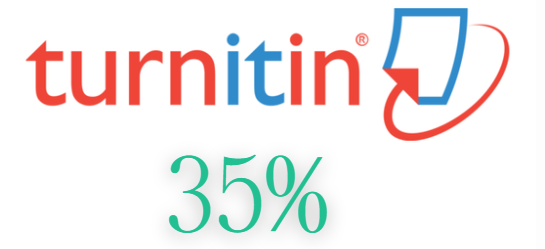Students’ Insights on the Effectiveness of ICT in Junior High School English Learning
Kata Kunci:
Information and Communication Technology, English Language Learning, Student Perception, Secondary Education, Time ManagementAbstrak
The use of Information and Communication Technology (ICT) in secondary education is increasing along with the development of technology during 21st century learning. This study aims to examine students' perceptions of the use of ICT in English learning at SMPN 6 Pekanbaru. Using quantitative method with survey design, this study involved 350 students as respondents selected through Simple Random Sampling technique. Data were collected using a questionnaire based on a Likert scale of 1-5 and analyzed using descriptive statistical techniques with the SPSS version 25 program. The results showed that students' perceptions of ICT use were in the moderate to high category with an average score of 3.30. In the aspect of time management, students find it helpful in organizing study schedules and completing assignments on time. In terms of confidence, students feel comfortable in communicating and learning through ICT platforms, although there are still doubts about the effectiveness of fully online learning. In addition, the benefits indicator shows that students appreciate easy access to learning resources, collaboration opportunities in group tasks, and interactive learning experience. This study concludes that although the use of ICT provides significant benefits in English language learning, steps are still needed to optimize its use.Referensi
Abacioglu, C. S., Volman, M., & Fischer, A. H. (2020). Teachers’ multicultural attitudes and perspective taking abilities as factors in culturally responsive teaching. British Journal of Educational Psychology, 90(3), 736–752. https://doi.org/10.1111/bjep.12328
Abdillah, J. A., & Sueb, S. (2022). Students’ Learning Motivation toward the Implementation of Blended Learning during Post-Pandemic EFL Classroom. Pioneer: Journal of Language and Literature; Vol 14 No 1 (2022)DO - 10.36841/Pioneer.V14i1.1706. https://unars.ac.id/ojs/index.php/pioneer/article/view/1706
Aguilera, E., & Pandya, J. Z. (2021). Critical literacies in a digital age: current and future issues. Pedagogies: An International Journal, 16(2), 103–110. https://doi.org/10.1080/1554480X.2021.1914059
Aini, Q., Hidayat, D. N., Husna, N., & Alek, A. (2023). Discourse Analysis of Directive Speech Acts Used by Teachers in Classroom Interactions. JET (Journal of English Teaching), 9(2), 137–150. https://doi.org/10.33541/jet.v9i2.4566
AlZuhair, N. F., & Alkhuzaim, K. M. (2022). The Effectiveness of a Gamified Electronic Application in Developing Reading Comprehension Abilities among First-Grade Intermediate Students in Saudi Arabia. Education Research International, 2022(1), 7677140. https://doi.org/https://doi.org/10.1155/2022/7677140
Ammade, S., Mahmud, M., Jabu, B., & Tahmir, S. (2018). Integrating Technology in English Language Teaching: Global Experiences and Lessons for Indonesia. International Journal of English Linguistics, 8(6), 107. https://doi.org/10.5539/ijel.v8n6p107
Argudo-Serrano, J., Fajardo-Dack, T., Abad-Célleri, M., & Cabrera-Tenecela, P. (2023). Factors Affecting Students’ Motivation and Engagement in EFL Online Classes during the COVID-19 Pandemic. MEXTESOL Journal, 47(4), n4.
Asare, S., Amidu, A., Aning, E., Ampomah, T., Bediako, Y. A., Amuaful, E., & Baah, K. B. (2023). The Impact of Integrating Information Technology in Teaching English in College of Education: A Systematic Review . American Journal of Education and Technology, 2(3 SE-Review Article), 76–82. https://doi.org/10.54536/ajet.v2i3.1840
Ayu, C., & Rizky, R. (2023). Unlocking the Power of Peer Assessment Technique: A Catalyst for Enhanced Writing Skills in Higher Education. AL-ISHLAH: Jurnal Pendidikan; Vol 15, No 4 (2023): AL-ISHLAH: JURNAL PENDIDIKANDO - 10.35445/Alishlah.V15i4.4735 . https://journal.staihubbulwathan.id/index.php/alishlah/article/view/4735
Ayu, C., Rizky, R., & Herdi, H. (2024). Digital Humor and Its Impact on Adolescent Literacy: A Look At High School Reading Trends. English Review: Journal of English Education, 12(2). https://doi.org/10.25134/erjee.v12i2.9420
Baker, L. A., & Spencely, C. (2023). Is hybrid teaching delivering equivalent learning for students in higher education? Journal of Further and Higher Education, 47(5), 674–686. https://doi.org/10.1080/0309877X.2023.2183357
Bastian, A., Firdaus, M., & Rizky, R. (2023). The School Readiness in Implementing the Merdeka Curriculum in Pekanbaru : A Survey of Teachers and Students’ Perspectives. Jurnal Kependidikan: Jurnal Hasil Penelitian Dan Kajian Kepustakaan Di Bidang Pendidikan, Pengajaran Dan Pembelajaran, 9(4), 1162–1173. https://doi.org/https://doi.org/10.33394/jk.v9i4.9321
Bereczki, E. O., & Kárpáti, A. (2021). Technology-enhanced creativity: A multiple case study of digital technology-integration expert teachers’ beliefs and practices. Thinking Skills and Creativity, 39, 100791. https://doi.org/https://doi.org/10.1016/j.tsc.2021.100791
Brunetti, F., Matt, D. T., Bonfanti, A., De Longhi, A., Pedrini, G., & Orzes, G. (2020). Digital transformation challenges: strategies emerging from a multi-stakeholder approach. The TQM Journal, 32(4), 697–724. https://doi.org/10.1108/TQM-12-2019-0309
Cohen, L., Manion, L., & Morrison, K. (2013). Research methods in education. Routledge. https://doi.org/https://doi.org/10.4324/9780203720967
EKİZER, F., & Akıncı, B. (2023). The effect of humour strategies on speaking anxiety in EFL classesMizah stratejilerinin İngilizce yabancı dil sınıflarında konuşma kaygısına etkisi. RumeliDE Dil ve Edebiyat Araştırmaları Dergisi. https://doi.org/10.29000/rumelide.1252895
Fabian, K., Smith, S., & Taylor-Smith, E. (2024). Being in Two Places at the Same Time: a Future for Hybrid Learning Based on Student Preferences. TechTrends, 68(4), 693–704. https://doi.org/10.1007/s11528-024-00974-x
Fang, M., & Abdullah, R. (2024). EFL Teachers’ Use of ICT and Learner-centered Teaching Strategies to Improve English Listening Instruction-A Bibliometric Analysis. Educational Administration: Theory and Practice, 30(1).
Herwiana, S., & Laili, E. N. (2022). Exploring Benefits and Obstacles of Online Learning During the Covid-19 Pandemic in Efl Students’ Experiences. QALAMUNA: Jurnal Pendidikan, Sosial, Dan Agama, 14(1), 61–72. https://doi.org/10.37680/qalamuna.v14i1.1259
Ikhwan, E., & Andriyanti, E. (2021). Students’ Motivation to Acquire English through Virtual Learning Midst Covid-19 Pandemic. Lingua Cultura, 15. https://doi.org/10.21512/lc.v15i1.6839
Jiang, P., Namaziandost, E., Azizi, Z., & Razmi, M. H. (2023). Exploring the effects of online learning on EFL learners’ motivation, anxiety, and attitudes during the COVID-19 pandemic: a focus on Iran. Current Psychology (New Brunswick, N.J.), 42(3), 2310–2324. https://doi.org/10.1007/s12144-022-04013-x
Kamalov, F., Santandreu Calonge, D., & Gurrib, I. (2023). New Era of Artificial Intelligence in Education: Towards a Sustainable Multifaceted Revolution. In Sustainability (Vol. 15, Issue 16). https://doi.org/10.3390/su151612451
Kraus, S., Jones, P., Kailer, N., Weinmann, A., Chaparro-Banegas, N., & Roig-Tierno, N. (2021). Digital Transformation: An Overview of the Current State of the Art of Research. Sage Open, 11(3), 21582440211047576. https://doi.org/10.1177/21582440211047576
Küçükakın, P., & Demi̇r, C. (2021). The Relationship Between Classroom Management and Students’ Learning: A Systematic Review. Nevşehir Hacı Bektaş Veli Üniversitesi SBE Dergisi, 11. https://doi.org/10.30783/nevsosbilen.894503
Labib, M. M., Santosa, B., & Susatya, E. (2023). Job Sheet Implementation as a Resource Mechanical Engineering Practice Learning at SMK Muhammadiyah 1 Sukoharjo. Journal of Vocational Education Studies, 6(1), 147–155. https://doi.org/10.12928/joves.v6i1.7714
Lestari, L., & Asari, S. (2023). Investigating Students’ Motivation in Learning Speaking through Online Learning. Journal Of Digital Learning And Distance Education, 1, 338–345. https://doi.org/10.56778/jdlde.v1i9.75
Liu, Z. Y., Lomovtseva, N., & Korobeynikova, E. (2020). Online learning platforms: Reconstructing modern higher education. International Journal of Emerging Technologies in Learning, 15(13), 4–21. https://doi.org/10.3991/ijet.v15i13.14645
Lythreatis, S., Singh, S. K., & El-Kassar, A.-N. (2022). The digital divide: A review and future research agenda. Technological Forecasting and Social Change, 175, 121359. https://doi.org/https://doi.org/10.1016/j.techfore.2021.121359
Meşe, E., & Sevilen, Ç. (2021). Factors influencing EFL students’ motivation in online learning: A qualitative case study. Journal of Educational Technology and Online Learning, 4(1), 11–22. https://dergipark.org.tr/en/pub/jetol/issue/60134/817680
Meshkat, M., & Mohammadpour, R. (2019). The Effect of a Reading Application on the Reading Comprehension and Reading Self-Efficacy of Language Learners. Journal of Language Horizons, 3(1), 93–113. https://doi.org/10.22051/lghor.2019.25118.1100
Nadhirah, M., Hadiyanto, & Harjono, H. S. (2024). Effectiveness of Use of Interactive Wordwall Media in Class VII Procedure Text Materials at MTS Al-Hidayah Sungkai. Asian Journal of Education and Social Studies, 50(1 SE-Original Research Article), 212–221. https://doi.org/10.9734/ajess/2024/v50i11251
Noor, U., Younas, M., Saleh Aldayel, H., Menhas, R., & Qingyu, X. (2022). Learning behavior, digital platforms for learning and its impact on university student’s motivations and knowledge development. Frontiers in Psychology, 13(November), 1–12. https://doi.org/10.3389/fpsyg.2022.933974
Opuni, F., & Alhassan, I. (2023). The Likert Scale: Exploring The Unknowns And Their Potential To Mislead The World. 9, 867–880. https://doi.org/10.47740/586.UDSIJD6i
Ramadansur, R., Bastian, A., Rizky, R., Sembiring, A. K., Herdi, H., & Derin, T. (2024). A Solution with Its Own Problems : Analysing the Problems Encountered by the “Kampus Mengajar” Program. Jurnal Kependidikan: Jurnal Hasil Penelitian Dan Kajian Kepustakaan Di Bidang Pendidikan, Pengajaran Dan Pembelajaran; Vol 10, No 1 (2024): MarchDO - 10.33394/Jk.V10i1.8839 . https://e-journal.undikma.ac.id/index.php/jurnalkependidikan/article/view/8839
Ramadansur, R., Sutomo, E., Rizky, R., & Sembiring, A. K. (2023). Exploring the Efficacy of Inquiry-Based Learning for the Human Respiratory System: Student Achievement in a High School Setting.
Rizky, R., & Zainil, Y. (2021). The Use of the Bits and Pieces Game on Students’ Achievement on Writing Report Text. Al-Ishlah: Jurnal Pendidikan, 13(1), 301–306. https://doi.org/10.35445/alishlah.v13i1.463.
Romadlon, F. (2022). English Peer Counseling to Engage Students’ Speaking Confidence and Motivation in Higher Education. Al-Ishlah: Jurnal Pendidikan, 14(1), 821–832. https://doi.org/https://doi.org/10.35445/alishlah.v14i1.1869
Rorimpandey, W. H. F., & Midun, H. (2021). Effect of Hybrid Learning Strategy and Self-Efficacy on Learning Outcomes. Journal of Hunan University, 48(8), 181–189.
Silitonga, R. H. Y. (2021). Self Regulated Learning Of Biology Education Students In Online Learning For Calculus Courses Reviewing From Gender. 3.
Siswati, B. H., Anantyarta, P., Humaidi, A., & Wicaksono, I. (2023). Contribution of critical thinking skills on concept understanding biology students at the implementation learning model. JPBIO (Jurnal Pendidikan Biologi), 8(2), 283–292.
Smith, E. E., & Storrs, H. (2023). Digital literacies, social media, and undergraduate learning: what do students think they need to know? International Journal of Educational Technology in Higher Education, 20(1), 29. https://doi.org/10.1186/s41239-023-00398-2
Sugiyono, S. (2017). Metode Penelitian Kuantitatif, Kualitatif, dan R&D. Alfabeta.
Sujarwo. (2021). Developing 21st Century Skills. Tefla Journal, 3(2), 76–82. https://doi.org/10.21009/eips.006.02.02
Syahdan, S., & Ali, F. A. (2022). A Call for the 21st Century Learning: Embedding Character Education in the English Worksheets. Paedagoria: Jurnal Kajian, Penelitian Dan Pengembangan Kependidikan, 13(1), 46–53.
Tasneem, N. (2021). Learner Motivation and Engagement in Virtual EFL Classes at the Tertiary Level in Bangladesh during the Pandemic. Lensa: Kajian Kebahasaan, Kesusastraan, Dan Budaya, 11, 107. https://doi.org/10.26714/lensa.11.1.2021.107-123
Tugiah, Syahputra, J., Islahati, Demina, & Zulmuqim. (2022). Shaping Quality Islamic Education in the Digital Age. INFLUENCE: INTERNATIONAL JOURNAL OF SCIENCE REVIEW, 4(2 SE-Articles), 297–306. https://influence-journal.com/index.php/influence/article/view/69
Twenge, J. M. (2019). More Time on Technology, Less Happiness? Associations Between Digital-Media Use and Psychological Well-Being. Current Directions in Psychological Science, 28(4), 372–379. https://doi.org/10.1177/0963721419838244
Utomo, D. B., Suhariadi, F., Purwono, R., & Suginantra, P. A. (2024). The Impact of the Experiential Learning Model on Increasing Digital Skills for Employees. Journal of Law and Sustainable Development, 12(1), e966. https://doi.org/10.55908/sdgs.v12i1.966
Vadivel, B., Namaziandost, E., & Saeedian, A. (2021). Progress in English Language Teaching Through Continuous Professional Development—Teachers’ Self-Awareness, Perception, and Feedback. Frontiers in Education, 6. https://www.frontiersin.org/journals/education/articles/10.3389/feduc.2021.757285
Vodă, A. I., Cautisanu, C., Grădinaru, C., Tănăsescu, C., & de Moraes, G. H. (2022). Exploring Digital Literacy Skills in Social Sciences and Humanities Students. In Sustainability (Vol. 14, Issue 5). https://doi.org/10.3390/su14052483
Wahyudi, M., Sofendi, S., & Silvhiany, S. (2023). Lecturers and Students Perceptions on E-learning Implementation: A Case Study in English Education Study Program. AL-ISHLAH: Jurnal Pendidikan; Vol 15, No 4 (2023): AL-ISHLAH: JURNAL PENDIDIKAN. https://doi.org/10.35445/alishlah.v15i4.4396
Wandari, T., Unsiah, F., & Sahar, R. (2024). Utilizing Wordwall.Net on the Improvement of Students’ Vocabulary Mastery: An ICT-Based Lesson. Journal of Languages and Language Teaching; Vol 12, No 2 (2024)DO - 10.33394/Jollt.V12i2.10754 . https://e-journal.undikma.ac.id/index.php/jollt/article/view/10754
Xue, L., Rashid, A. M., & Ouyang, S. (2024). The Unified Theory of Acceptance and Use of Technology (UTAUT) in Higher Education: A Systematic Review. Sage Open, 14(1), 21582440241229570. https://doi.org/10.1177/21582440241229570









